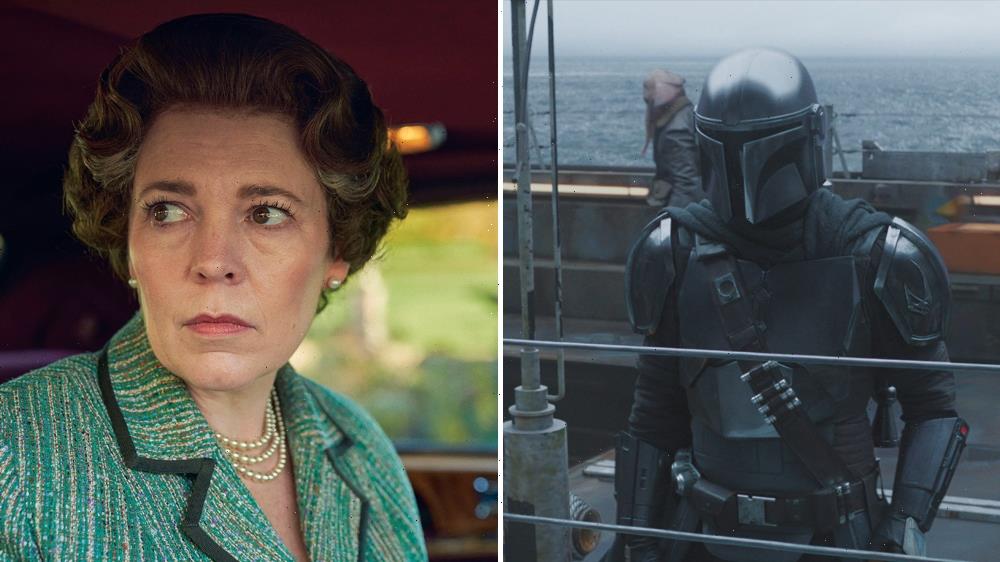In Regency era England, one moment of impropriety was all it took to sink a young lady’s marriage prospects or to ruin a family’s honor.
“Underneath the glamour and the lavishness of this escapist world, there is this running modern commentary about how in the last 200 years, everything has changed but nothing has changed,” says showrunner Chris Van Dusen. “I think that’s true for family and sexuality and relationship, and also for duty and honor.”
The Netflix series is one of several of this year’s drama Emmy nominees, in addition to “The Crown” and “The Mandalorian,” which place purpose at the center of the story, testing whether their characters will defy their duty, embrace it or be consumed by it.
Despite his Netflix piece being set more than two centuries in the past, Van Dusen says the pressures faced by the likes of the head-strong duke of Hastings (Regé-Jean Page) and the rebellious Eloise Bridgerton (Claudia Jessie) are similar to those before young people today. Going forward, the series will focus on Anthony Bridgerton (Jonathan Bailey) specifically, continuing to explore his “inherent conflict between love and duty” and to answer what Van Dusen describes as the show’s central question: “Can love conquer all?”
On Season 4 of “The Crown,” Prince Charles (Josh O’Connor) finds himself in a remarkably similar situation to Anthony. After the one-two punch of being denied a match with his true love Camilla Shand (Emerald Fennell) and losing his mentor-come-father figure Lord Mountbatten (Charles Dance), Charles turns his attention to fulfilling his duty as heir to the throne, setting his sights on the young Lady Diana Spencer (Emma Corrin).
“He is struck not only by her youth, beauty, and vitality, but by her aristocratic pedigree too,” says executive producer Suzanne Mackie. “Recognizing her suitability, he quickly proposes. But though their union appears to be a fairytale romance, Charles feels increasingly overshadowed by Diana’s rising star and perhaps his feelings for Camilla haven’t quite receded.”
The royal family’s entire sense of duty revolves around the queen, as Prince Philip (Tobias Menzies) coldly reminds Diana in the Season 4 finale. However, Mackie says even Her Majesty’s supposedly unwavering sense of duty faces its “greatest challenge” in the form of Margaret Thatcher (Gillian Anderson). The formidable pair effectively go to war over their differing visions for the country and the Commonwealth.
“The state of Thatcher’s Britain deeply affects the queen, which in turn makes her question the limits of her own responsibility as a constitutional monarch,” Mackie says. “Whilst Thatcher wants to re-shape the country by any means necessary, the queen desires stability both for the monarchy and for Britain.”
The perception of duty for the titular character in Disney Plus’ “The Mandalorian” is also dramatically altered by the arrival not of an elder stateswoman, but of a little green alien.
Mando (Pedro Pascal) starts the series as a lonesome figure who doesn’t care whether others view him as a good or bad person, as long as he gets paid. His “whole life is changed” when Grogu’s over-sized ears pop into the picture, and his life is given a sense of purpose, says executive producer Dave Filoni.
“Protecting Grogu and finding where he’s from becomes the most important thing in his life,” Filoni says. “When he may have sat out on this opportunity in the first season, in this second season Mando starts basing all his choices around Grogu.”
Mando embraces his newfound duty, making it his mission to bring Grogu home. “Everyone has that paternal instinct, and I think it’s a credit to Jon [Favreau, creator] and the design team for landing on this adorable character that we all feel empathy for, just like Mando does. We’re all rooting for him to return home,” Filoni says.
Source: Read Full Article
